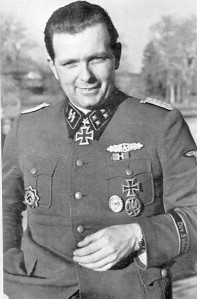| The neutrality of this article is disputed. Relevant discussion may be found on the talk page. Please do not remove this message until conditions to do so are met. (April 2022) (Learn how and when to remove this message) |
| Helmut Kämpfe | |
|---|---|
 | |
| Born | (1909-07-31)31 July 1909 Jena, German Empire |
| Died | 10 June 1944(1944-06-10) (aged 34) German-occupied France |
| Allegiance | |
| Service | |
| Years of service | 1939–44 |
| Rank | Sturmbannführer |
| Unit | 2nd SS Panzer Division Das Reich |
| Battles / wars | World War II |
| Awards | |
Helmut Kämpfe (31 July 1909 – 10 June 1944) was a Waffen-SS Sturmbannführer who was captured and executed by the French Resistance. In retribution, the Germans carried out the Oradour massacre in occupied France on 10 June 1944. In total 643 men, women and children were killed in Oradour-sur-Glane by troops from the 2nd SS Panzer Division Das Reich. Adolf Diekmann, the SS commander who ordered the massacre, said the death of Kämpfe was the reason for the killings.
Kämpfe was a commander in 2nd SS Panzer Division Das Reich. He was a highly decorated soldier, having received both the Close Combat Clasp in Gold and the Knight's Cross of the Iron Cross.
Biography
Kämpfe was born in Thüringen, Germany in 1909. He trained to be a typographer like his father, but after Hitler took power in 1933 he became a Leutnant in the Heer before transferring to the Waffen-SS in 1939. On the Eastern Front in Russia, he commanded the 3rd Battalion, 4th SS-Panzergrenadier Der Führer Regiment, the Das Reich Division's reconnaissance group. Kämpfe received the Knights Cross of the Iron Cross for bravery and exemplary leadership during the Zhitomir–Berdichev Offensive in the winter of 1943-44.
In spring 1944, the Das Reich Division had been withdrawn from Russia and sent to the south of France for refitting in preparation for the anticipated Allied invasion of occupied Europe. While in southern France, Kämpfe was ordered to begin operations against the Maquis (rural guerillas who - according to German intelligence reports - were active in the southern uplands of central France). On 9 June 1944, he was captured 4 km (2.5 mi) east of Saint-Léonard-de-Noblat by a group led by a Sergeant Jean Canou from Colonel Georges Guingouin's Brigade, a militant Communist group in the Maquis du Limousin. Canou handed him over to Guingouin. The following day Kämpfe was executed on the orders of Guingouin. According to a French informant Kämpfe was burned alive in front of an audience, but the exact circumstances remain unclear.
When it was discovered that the highly decorated officer had been kidnapped, troops from the Das Reich division and members of the Milice began a brutal search of the surrounding area for Kämpfe. Two local men were shot dead 2.5 km (1.6 mi) east of Saint-Léonard-de-Noblat. Later that day the massacre at Oradour-sur-Glane was committed by troops from the 1st Battalion, Das Reich.
The commander of the 4th SS Panzer Grenadier Regiment, SS-Standartenführer Sylvester Stadler ordered a court martial into the massacre at Oradour-sur-Glane. SS-Sturmbannführer Adolf Diekmann, the commander of the 1st Battalion, 4th SS Panzer Grenadier Regiment, and a personal friend of Kämpfe, was charged over the killings. He said he found Kämpfe's handcuffed body inside a German field ambulance with the remains of other German soldiers just outside the village of Oradour-sur-Glane. The vehicle had been set alight burning alive everyone inside. After seeing his friend's fate, the village was destroyed on his orders. SS-Brigadeführer Heinz Lammerding, Das Reich's division commander, agreed that Diekmann should face a court martial. All charges were dropped when Diekmann was killed fighting in Normandy on June 29, 1944.
References
Notes
- ^ Mitcham, Samuel W. (2009). Defenders of Fortress Europe: The Untold Story of the German Officers During the Allied Invasion. Potomac Books, Inc. p. 66. ISBN 9781597972741.
- Berger 2004, p. 6.
- ^ "Helmut Kämpfe". www.findagrave.com. Retrieved 14 June 2018.
- "Memorial to the kidnapping of Kämpfe on the N141". www.oradour.info. Retrieved 14 June 2018.
- "Memorial to the shooting of local men on the N141". www.oradour.info. Retrieved 14 June 2018.
- "1944: Massacre at Oradour-sur-Glane". www.executedtoday.com. 10 June 2013. Retrieved 14 June 2018.
- "Adolf Otto Diekmann". www.findagrave.com. Retrieved 14 June 2018.
Bibliography
- Berger, Florian (2004). Ritterkreuzträger mit Nahkampfspange in Gold [Knight's Cross Bearers with the Close Combat Clasp in Gold] (in German). Vienna, Austria: Selbstverlag Florian Berger. ISBN 978-3-9501307-3-7.
- Fellgiebel, Walther-Peer (2000) . Die Träger des Ritterkreuzes des Eisernen Kreuzes 1939–1945 — Die Inhaber der höchsten Auszeichnung des Zweiten Weltkrieges aller Wehrmachtteile [The Bearers of the Knight's Cross of the Iron Cross 1939–1945 — The Owners of the Highest Award of the Second World War of all Wehrmacht Branches] (in German). Friedberg, Germany: Podzun-Pallas. ISBN 978-3-7909-0284-6.
- Penaud, Guy. Oradour-sur-Glane - Un jour de juin 1944 en enfer, Geste éditions, mars 2014, ISBN 2 367 46171 6.
- Scherzer, Veit (2007). Die Ritterkreuzträger 1939–1945 Die Inhaber des Ritterkreuzes des Eisernen Kreuzes 1939 von Heer, Luftwaffe, Kriegsmarine, Waffen-SS, Volkssturm sowie mit Deutschland verbündeter Streitkräfte nach den Unterlagen des Bundesarchives [The Knight's Cross Bearers 1939–1945 The Holders of the Knight's Cross of the Iron Cross 1939 by Army, Air Force, Navy, Waffen-SS, Volkssturm and Allied Forces with Germany According to the Documents of the Federal Archives] (in German). Jena, Germany: Scherzers Miltaer-Verlag. ISBN 978-3-938845-17-2.